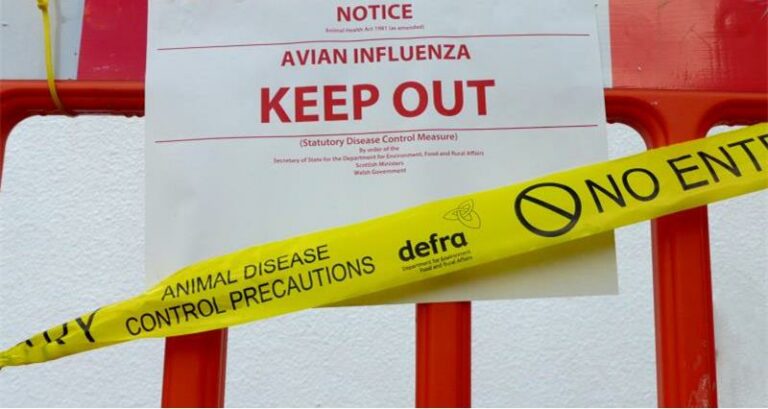The UK has officially declared itself free of AI after one of the worst seasons for the disease. But the effects are still being felt.
At the start of November 2020, avian influenza (AI) was confirmed at a small commercial poultry premises near Deal in Kent. It was the first case of the autumn and winter, in what was to turn out to be a terrible season for the disease both in the UK and across Europe. In all, 26 outbreaks of AI occurred in the UK during the 2020/21 season, causing huge disruption to the affected farms, and the movement of poultry, both domestically and internationally.
And it’s not just the UK that has had a bad year. The EU has continued to battle outbreaks throughout the summer and recently revealed the effects of AI will lead to a decline in poultry meat production during 2021.
AI outbreaks hit 18 EU countries and is continuing to hinder production in major producing countries, notably Poland, the largest EU poultry producer. While the overall production impact in terms of birds culled remains limited, the disease “affected also breeder farms, making production recovery challenging,” the EU’s report states.
Price rises
AI-related export bans of poultry meat led the EU poultry industry to cut production in the first quarter of 2021 (-4.4% year-on-year).
Prices for EU broilers reached exceptionally high levels in the second quarter of 2021, up 8% on the five-year average, reaching more than EUR 200/100 kg early June, the EU report states. Despite high prices, producers are under pressure, with feed costs rising even quicker, the report states.
EU poultry meat imports are expected to remain stable in 2021. In 2020, they fell sharply with imports from Ukraine constrained by AI-related restrictions. EU poultry meat exports are expected to continue decreasing in 2021 (-5%), the report states. Although seasonal AI is fading, associated export restrictions are still in place and will be lifted only gradually.
Export restrictions
In the UK, the country’s new status as a third country relative to the EU has posed its own challenges with AI outbreaks.
In the event of AI in a third country, the EU immediately ceases all poultry related trade with that nation. The Commission then votes to recognise regionalisation in that country, so that trade is only restricted from the specific region where the bird flu incident has occurred. For every single incident, the EU ports are immediately closed to trade until the vote is taken. In every case, this means exports have been suspended for between 24-36 hours, meaning a lost day of trade, lorries turned around or held in ports, and ultimately of food waste.
Workshop for producers
An online workshop is being held on the lessons learnt from last year’s AI season on 13 September. It will be hosted by the Veterinary Technical Group of the UK Poultry Health and Welfare Group and will update the industry on ‘forecasting’ future risk of avian influenza breaks.
Some within the industry believe suggests that outbreaks as severe as the last AI season may become more regular.
The industry and government have made progress in dealing with AI outbreaks in recent years, both in terms of communication, disease management and reducing spread within the industry, the workshop will explore any weak links found in cases of primary introduction of AI into poultry flocks.
You can register for the event at https://www.eventbrite.co.uk/e/notifiable-avian-disease-a-joint-poultry-industrygovernment-workshop-registration-167623214547

Previous ArticleComment: Labour shortages could affect animal welfare
Next Article Trouw Nutrition invests £2m in feed mill
Chloe Ryan
Editor of Poultry Business, Chloe has spent the past decade writing about the food industry from farming, through manufacturing, retail and foodservice. When not working, dog walking and reading biographies are her favourite hobbies.

